Alexandre Laterre
SMX: Sequential Monte Carlo Planning for Expert Iteration
Feb 12, 2024Abstract:Developing agents that can leverage planning abilities during their decision and learning processes is critical to the advancement of Artificial Intelligence. Recent works have demonstrated the effectiveness of combining tree-based search methods and self-play learning mechanisms. Yet, these methods typically face scaling challenges due to the sequential nature of their search. While practical engineering solutions can partly overcome this, they still demand extensive computational resources, which hinders their applicability. In this paper, we introduce SMX, a model-based planning algorithm that utilises scalable Sequential Monte Carlo methods to create an effective self-learning mechanism. Grounded in the theoretical framework of control as inference, SMX benefits from robust theoretical underpinnings. Its sampling-based search approach makes it adaptable to environments with both discrete and continuous action spaces. Furthermore, SMX allows for high parallelisation and can run on hardware accelerators to optimise computing efficiency. SMX demonstrates a statistically significant improvement in performance compared to AlphaZero, as well as demonstrating its performance as an improvement operator for a model-free policy, matching or exceeding top model-free methods across both continuous and discrete environments.
Combinatorial Optimization with Policy Adaptation using Latent Space Search
Nov 13, 2023Abstract:Combinatorial Optimization underpins many real-world applications and yet, designing performant algorithms to solve these complex, typically NP-hard, problems remains a significant research challenge. Reinforcement Learning (RL) provides a versatile framework for designing heuristics across a broad spectrum of problem domains. However, despite notable progress, RL has not yet supplanted industrial solvers as the go-to solution. Current approaches emphasize pre-training heuristics that construct solutions but often rely on search procedures with limited variance, such as stochastically sampling numerous solutions from a single policy or employing computationally expensive fine-tuning of the policy on individual problem instances. Building on the intuition that performant search at inference time should be anticipated during pre-training, we propose COMPASS, a novel RL approach that parameterizes a distribution of diverse and specialized policies conditioned on a continuous latent space. We evaluate COMPASS across three canonical problems - Travelling Salesman, Capacitated Vehicle Routing, and Job-Shop Scheduling - and demonstrate that our search strategy (i) outperforms state-of-the-art approaches on 11 standard benchmarking tasks and (ii) generalizes better, surpassing all other approaches on a set of 18 procedurally transformed instance distributions.
Jumanji: a Diverse Suite of Scalable Reinforcement Learning Environments in JAX
Jun 16, 2023Abstract:Open-source reinforcement learning (RL) environments have played a crucial role in driving progress in the development of AI algorithms. In modern RL research, there is a need for simulated environments that are performant, scalable, and modular to enable their utilization in a wider range of potential real-world applications. Therefore, we present Jumanji, a suite of diverse RL environments specifically designed to be fast, flexible, and scalable. Jumanji provides a suite of environments focusing on combinatorial problems frequently encountered in industry, as well as challenging general decision-making tasks. By leveraging the efficiency of JAX and hardware accelerators like GPUs and TPUs, Jumanji enables rapid iteration of research ideas and large-scale experimentation, ultimately empowering more capable agents. Unlike existing RL environment suites, Jumanji is highly customizable, allowing users to tailor the initial state distribution and problem complexity to their needs. Furthermore, we provide actor-critic baselines for each environment, accompanied by preliminary findings on scaling and generalization scenarios. Jumanji aims to set a new standard for speed, adaptability, and scalability of RL environments.
Debiasing Meta-Gradient Reinforcement Learning by Learning the Outer Value Function
Nov 19, 2022



Abstract:Meta-gradient Reinforcement Learning (RL) allows agents to self-tune their hyper-parameters in an online fashion during training. In this paper, we identify a bias in the meta-gradient of current meta-gradient RL approaches. This bias comes from using the critic that is trained using the meta-learned discount factor for the advantage estimation in the outer objective which requires a different discount factor. Because the meta-learned discount factor is typically lower than the one used in the outer objective, the resulting bias can cause the meta-gradient to favor myopic policies. We propose a simple solution to this issue: we eliminate this bias by using an alternative, \emph{outer} value function in the estimation of the outer loss. To obtain this outer value function we add a second head to the critic network and train it alongside the classic critic, using the outer loss discount factor. On an illustrative toy problem, we show that the bias can cause catastrophic failure of current meta-gradient RL approaches, and show that our proposed solution fixes it. We then apply our method to a more complex environment and demonstrate that fixing the meta-gradient bias can significantly improve performance.
Reinforcement Learning for Branch-and-Bound Optimisation using Retrospective Trajectories
May 28, 2022


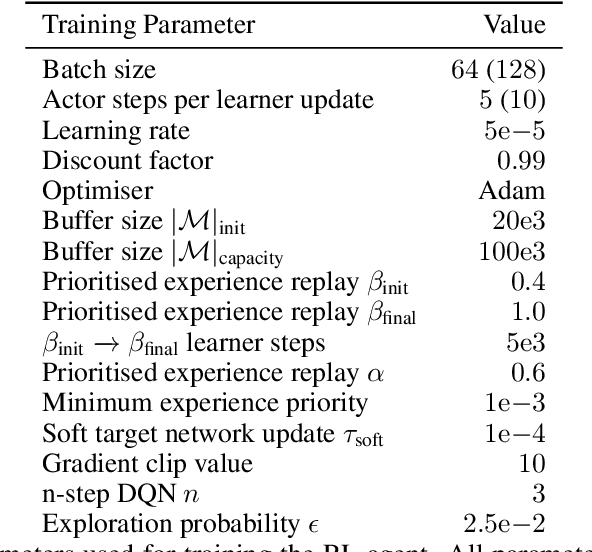
Abstract:Combinatorial optimisation problems framed as mixed integer linear programmes (MILPs) are ubiquitous across a range of real-world applications. The canonical branch-and-bound (B&B) algorithm seeks to exactly solve MILPs by constructing a search tree of increasingly constrained sub-problems. In practice, its solving time performance is dependent on heuristics, such as the choice of the next variable to constrain ('branching'). Recently, machine learning (ML) has emerged as a promising paradigm for branching. However, prior works have struggled to apply reinforcement learning (RL), citing sparse rewards, difficult exploration, and partial observability as significant challenges. Instead, leading ML methodologies resort to approximating high quality handcrafted heuristics with imitation learning (IL), which precludes the discovery of novel policies and requires expensive data labelling. In this work, we propose retro branching; a simple yet effective approach to RL for branching. By retrospectively deconstructing the search tree into multiple paths each contained within a sub-tree, we enable the agent to learn from shorter trajectories with more predictable next states. In experiments on four combinatorial tasks, our approach enables learning-to-branch without any expert guidance or pre-training. We outperform the current state-of-the-art RL branching algorithm by 3-5x and come within 20% of the best IL method's performance on MILPs with 500 constraints and 1000 variables, with ablations verifying that our retrospectively constructed trajectories are essential to achieving these results.
Learning to Solve Combinatorial Graph Partitioning Problems via Efficient Exploration
May 27, 2022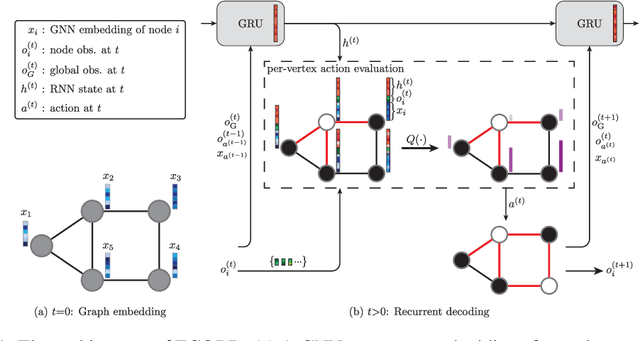
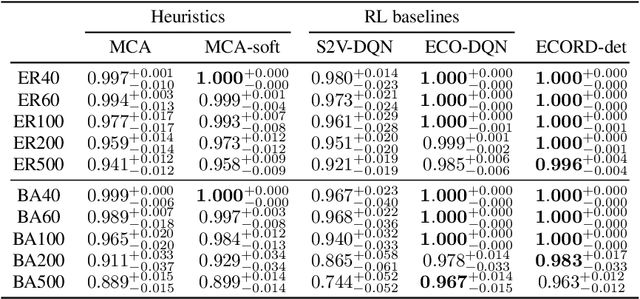

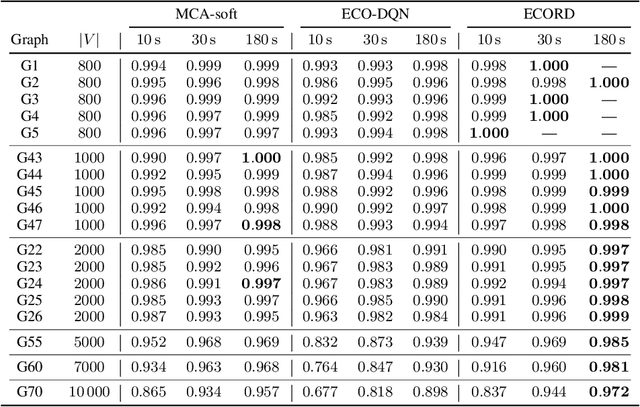
Abstract:From logistics to the natural sciences, combinatorial optimisation on graphs underpins numerous real-world applications. Reinforcement learning (RL) has shown particular promise in this setting as it can adapt to specific problem structures and does not require pre-solved instances for these, often NP-hard, problems. However, state-of-the-art (SOTA) approaches typically suffer from severe scalability issues, primarily due to their reliance on expensive graph neural networks (GNNs) at each decision step. We introduce ECORD; a novel RL algorithm that alleviates this expense by restricting the GNN to a single pre-processing step, before entering a fast-acting exploratory phase directed by a recurrent unit. Experimentally, ECORD achieves a new SOTA for RL algorithms on the Maximum Cut problem, whilst also providing orders of magnitude improvement in speed and scalability. Compared to the nearest competitor, ECORD reduces the optimality gap by up to 73% on 500 vertex graphs with a decreased wall-clock time. Moreover, ECORD retains strong performance when generalising to larger graphs with up to 10000 vertices.
One Step at a Time: Pros and Cons of Multi-Step Meta-Gradient Reinforcement Learning
Oct 30, 2021


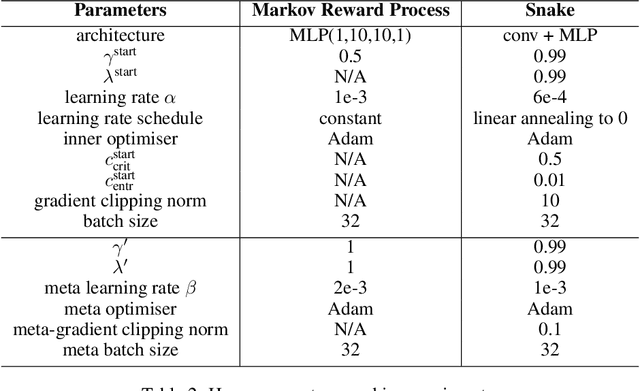
Abstract:Self-tuning algorithms that adapt the learning process online encourage more effective and robust learning. Among all the methods available, meta-gradients have emerged as a promising approach. They leverage the differentiability of the learning rule with respect to some hyper-parameters to adapt them in an online fashion. Although meta-gradients can be accumulated over multiple learning steps to avoid myopic updates, this is rarely used in practice. In this work, we demonstrate that whilst multi-step meta-gradients do provide a better learning signal in expectation, this comes at the cost of a significant increase in variance, hindering performance. In the light of this analysis, we introduce a novel method mixing multiple inner steps that enjoys a more accurate and robust meta-gradient signal, essentially trading off bias and variance in meta-gradient estimation. When applied to the Snake game, the mixing meta-gradient algorithm can cut the variance by a factor of 3 while achieving similar or higher performance.
Mava: a research framework for distributed multi-agent reinforcement learning
Jul 03, 2021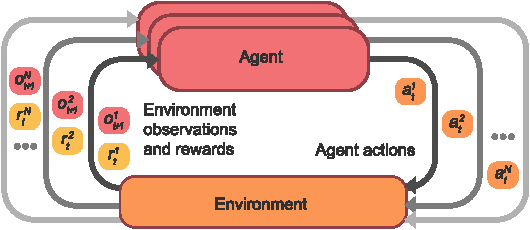
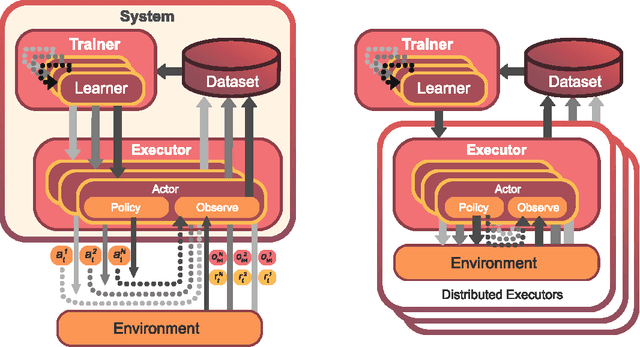


Abstract:Breakthrough advances in reinforcement learning (RL) research have led to a surge in the development and application of RL. To support the field and its rapid growth, several frameworks have emerged that aim to help the community more easily build effective and scalable agents. However, very few of these frameworks exclusively support multi-agent RL (MARL), an increasingly active field in itself, concerned with decentralised decision-making problems. In this work, we attempt to fill this gap by presenting Mava: a research framework specifically designed for building scalable MARL systems. Mava provides useful components, abstractions, utilities and tools for MARL and allows for simple scaling for multi-process system training and execution, while providing a high level of flexibility and composability. Mava is built on top of DeepMind's Acme \citep{hoffman2020acme}, and therefore integrates with, and greatly benefits from, a wide range of already existing single-agent RL components made available in Acme. Several MARL baseline systems have already been implemented in Mava. These implementations serve as examples showcasing Mava's reusable features, such as interchangeable system architectures, communication and mixing modules. Furthermore, these implementations allow existing MARL algorithms to be easily reproduced and extended. We provide experimental results for these implementations on a wide range of multi-agent environments and highlight the benefits of distributed system training.
Designing a Prospective COVID-19 Therapeutic with Reinforcement Learning
Dec 03, 2020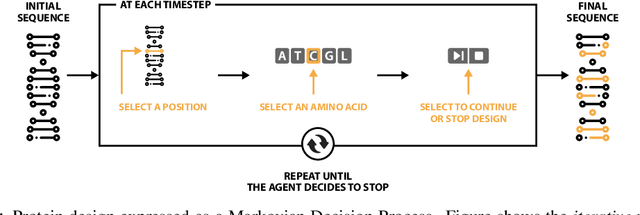
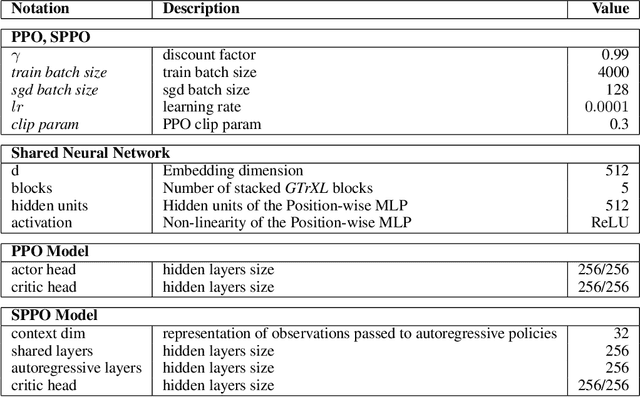
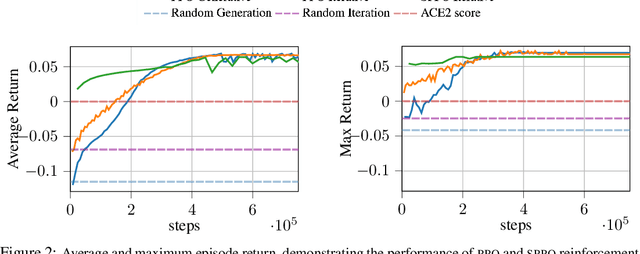
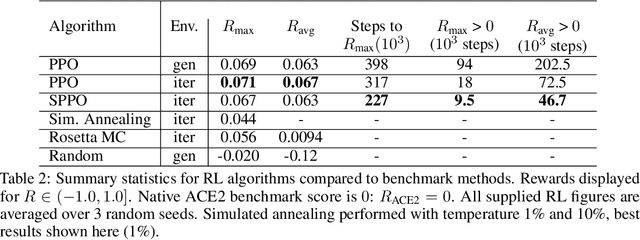
Abstract:The SARS-CoV-2 pandemic has created a global race for a cure. One approach focuses on designing a novel variant of the human angiotensin-converting enzyme 2 (ACE2) that binds more tightly to the SARS-CoV-2 spike protein and diverts it from human cells. Here we formulate a novel protein design framework as a reinforcement learning problem. We generate new designs efficiently through the combination of a fast, biologically-grounded reward function and sequential action-space formulation. The use of Policy Gradients reduces the compute budget needed to reach consistent, high-quality designs by at least an order of magnitude compared to standard methods. Complexes designed by this method have been validated by molecular dynamics simulations, confirming their increased stability. This suggests that combining leading protein design methods with modern deep reinforcement learning is a viable path for discovering a Covid-19 cure and may accelerate design of peptide-based therapeutics for other diseases.
Offline Reinforcement Learning Hands-On
Nov 29, 2020
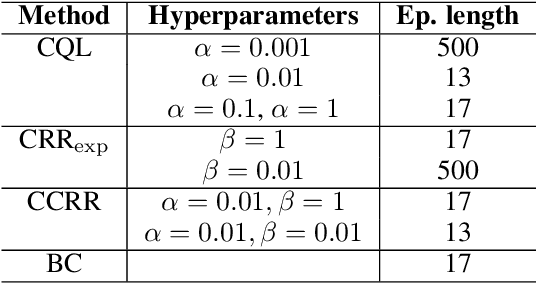
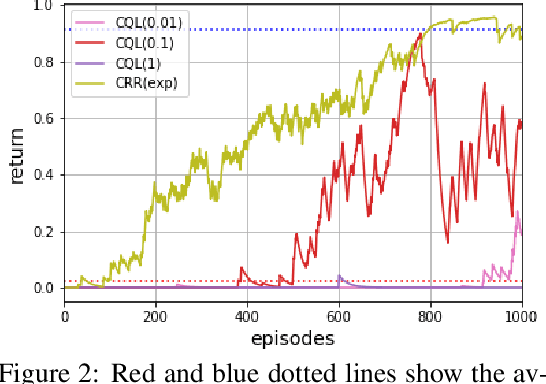
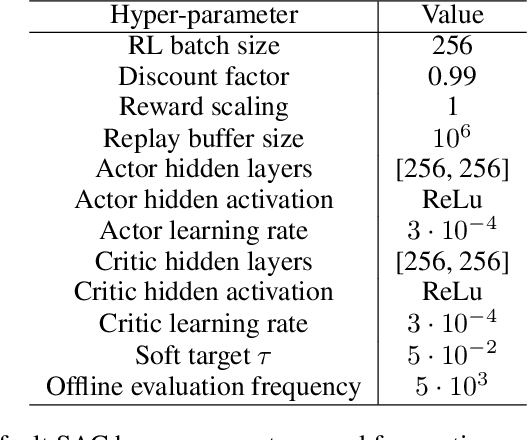
Abstract:Offline Reinforcement Learning (RL) aims to turn large datasets into powerful decision-making engines without any online interactions with the environment. This great promise has motivated a large amount of research that hopes to replicate the success RL has experienced in simulation settings. This work ambitions to reflect upon these efforts from a practitioner viewpoint. We start by discussing the dataset properties that we hypothesise can characterise the type of offline methods that will be the most successful. We then verify these claims through a set of experiments and designed datasets generated from environments with both discrete and continuous action spaces. We experimentally validate that diversity and high-return examples in the data are crucial to the success of offline RL and show that behavioural cloning remains a strong contender compared to its contemporaries. Overall, this work stands as a tutorial to help people build their intuition on today's offline RL methods and their applicability.
 Add to Chrome
Add to Chrome Add to Firefox
Add to Firefox Add to Edge
Add to Edge